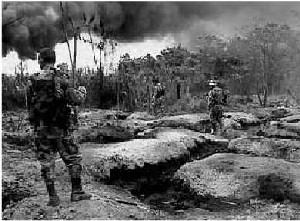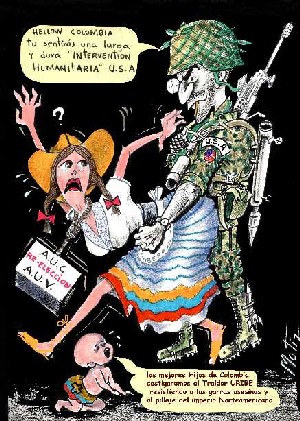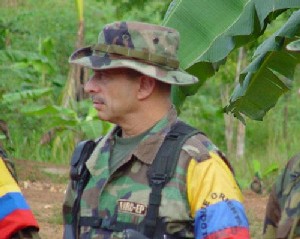Feature:
In
Annual
Ritual,
Bush
Administration
Seeks
More
Aid
for
Colombia
Drug
War
3/3/06
As springtime approaches, an annual Washington ritual is getting underway. Each year since late in the Clinton presidency, the US administration goes to Congress and asks it for a few hundred million dollars to prop up the US drug war in Colombia. This year is no different. Even though Clinton's five-year Plan Colombia is now in its seventh year, albeit under a different name, and has failed to make a significant dent in the flow of cocaine from Colombia, all expectations are that Congress will once again sign off on the Bush administration's $743 million Andean drug war budget request, most of which is headed to Colombia, where 80% will go to fund the war, while only 20% will fund alternative economic development.
Seven years into the heightened US effort, Colombia remains embroiled in a multi-sided civil war. Negotiations with the FARC are at a stand still, and while the paramilitaries have agreed to demobilize, that process is plagued with problems, questions, and inadequacies. Years of forced eradication, including a massive aerial spraying program have, at best, managed to hold cocaine production at current levels, while wreaking havoc on the fields, livestock, and health of the Colombian peasantry. Years of spraying and buying equipment for the Colombian military and police seem to have had little effect. The Colombian government of President Alvaro Uribe points to decreases in kidnappings and murders, but while security has improved in the cities, much of the countryside is either FARC territory or a contested no man's land, with coca-growing peasants caught in the crossfire. While US drug czar John Walters last fall pointed to a blip in cocaine prices as a sign of success, and coca growing in Colombia appears to have leveled off, both the United Nations and, this week, the US State Department have released figures suggesting that regional coca production is on the rise.
"The administration seems to be losing a bit of interest in the drug war now that it has the war on terror, which doesn't help us much in Latin America because whether it's war on drugs or war on terror, the military funding continues," said Lisa Haugaard, executive director of the Latin America Working Group, an umbrella organization of organizations working for a more progressive policy toward Colombia. "But there is a real drop off in funding for alternative development everywhere but Colombia, and that's going to hurt, especially in Bolivia. It's unfortunate to see those cuts." Funding for the drug war in Colombia has been a contentious issue for years, with critics charging that the US is funding bloody human rights violators in a chimerical effort to eradicate coca, but despite annual efforts by progressive Democrats, the funding typically gets through. This year looks to be no different. Chances are the administration will largely get what it wants again this year, Isaacson said. "It's probably going to get through relatively unscathed. There may be a move to try to cut Colombia aid across the board to fund other things. There will also likely be another amendment to move money from military aid to economic assistance, and it will probably fail with the same number of votes as last year. The Republican majority is like a brick wall on this." That doesn't mean opponents of the US drug war in Colombia have given up. They will continue to press for tighter human rights controls, a shift in funding from the military to economic development, and this year, close scrutiny of the paramilitary demobilization, which is raising eyebrows in both Bogota and Washington as rightist militia leaders linked to drug trafficking and atrocities appear to be escaping justice for their crimes. The human rights record of the Colombian military is also -- again -- raising concern on the Hill, Haugaard said. "The reality is that the picture doesn't look good for the Colombian military's human rights performance," she said, "and people in Congress will bring that up." Last year, similar concerns resulted in seven-months delay in the release of some funds. While the money eventually got to the generals, Haugaard said, there was a plus side: "It was a significant delay, and the State Department did raise specific cases with the Colombian government, so that forced human rights issues further up the chain of command, and that's a good thing," she said.
The issue of paramilitary demobilization is a sore one, Isaacson said. Under a negotiated agreement with the Uribe government, the paramilitaries agreed to disband in return for limited legal exposure for their human rights and drug trafficking offenses. But many para leaders are worming their way into political power, and the Organization of American States reported this week that some 4,000 demobilized fighters were "remobilizing" in Guaviare province. "The problem is," said Isaacson, "it doesn't seem to be getting rid of the paras. Instead, they are reorganizing as drug mafias with incredible political clout. This process won't make a dent in the drug flows, and it probably won't make much of a dent in the power of the paras," he predicted. The issue is even bothering some Republicans, said Haugaard. "There is concern over the demobilization of the paramilitaries and the impact that is having on justice and drug issues. There is considerable unease not just among Democrats, but among some Republicans, too. They see the process as too lax and the paras gaining another kind of political power." While the paramilitary leaders have been driven by good, old-fashioned greed and lust for power, the leftist rural guerrillas of the FARC seem to be driven more by ideology, are also proving undefeatable, and are unamenable to negotiations with the Uribe government. "The FARC leadership is rigidly ideological and they have always seen themselves as armed campesinos who want a piece of the pie and otherwise want to be left alone," said Isaacson. "If that means making common cause with the drug economy, so be it. But while the para leaders are no doubt spending their money on champagne and hookers, we have no intelligence suggesting the money the FARC makes off the trade is going to Swiss bank accounts, luxury swimming pools, or similar items. They're using their profits to buy guns." Given US policy-making inertia, Uribe's probable reelection in May, the FARC's intransigence, and the continuing vitality of the cocaine trade in Colombia, prospects for short-team progress look bleak. "The FARC will not deal with Uribe," said Isaacson. "That bodes ill for everything between now and 2010."
| |||||||||||||||||||||||||||||||||||||||||||||||||||||||||||||||||||||||||||||||||||||



